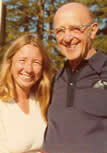About Carl R. Rogers
by Maureen O'Hara
Carl Rogers, the creator of client-centered therapy and counseling, student-centered education, and person-centered approaches to human relations and community building, is arguably the most influential American psychologist of the 20th century. While some may dispute this, pointing to the domination within academic psychology of the behaviorism of B.F. Skinner, if the view is widened beyond the academy to include the entire sphere of influence, the fact is indisputable that Rogers' profoundly humanizing psychology of human potential has been embraced by not only American culture but by much of the developed world. Those spheres include education, organizational consulting, health care, psychotherapy and counseling, community action and social agency, adult development , communications training, parenting education, and pastoral care.
Past president of the American Psychological Association, honored with its Distinguished Scientific Contribution Award in 1956, and recipient of its Professional Achievement Award in 1972, Rogers achieved significant recognition from mainstream psychology. However it was outside academics, in the daily work of practitioners and ordinary people, where his work had its biggest impact. His basic concepts were forged in the crucible of rigorous research over a fifty year career. Now, at the opening of the 21st century, Rogers' ideas are deeply embedded in all understanding of human behavior, and their revolutionary and fundamentally democratic implications have become part of our contemporary way of life. The faith that relationships built on honesty, mutual respect, empathy, and the unconditional affirmation of a person's inherent tendency to move towards individual self-fulfillment and social harmony provide the essential substrate for all human growth and healing--once heresy within a mechanistic psychology, with no faith in the resources of the human spirit--can now be found in every arena of life.
Through a publishing career beginning in 1931 with an article about personality adjustment in children , and continuing until today with new editions and reprints of his major works, including such culture -making best sellers as Client-Centered Therapy, On Becoming a Person, Freedom to Learn, Carl Rogers on Encounter Groups, Becoming Partners, On Personal Power, A Way of Being, Rogers' ideas are now known across the world translated into over 20 languages, and most of his books are still in print in a new century. Rogers' work can be found still referenced in contemporary works on subjects from psychotherapy to organizational change management, to conflict resolution, parent effectiveness, marital counseling, global peace-making and spiritual counseling.
Although originating in the North American heartland, and amid criticisms that much of American psychology reflected a world view that was distinctly Anglo-American and male, Rogers' work was nevertheless eagerly embraced by professionals across the world, His last decade of life took him to China, Sweden, Russia, Georgia, Finland, Belgium, Hungary, Japan, Italy, Mexico, Germany, Austria, Finland, Venezuela, Switzerland, Spain, England, Ireland, Kenya, Zimbabwe, South Africa, and Brazil. In each of these countries he met with hundreds of professionals eager to put his ideas into practice in their own context. When Black South African Cecil Bobibe, the Dean of Students at a South African college was asked what it was about Rogers' work that resonated so deeply with his own African sensibility and had convinced him to adopt it as his own way of working as a counselor, he explained that Rogers' work spoke eloquently to the "essential humanity" of people. "It gives one faith in who we are, and shows one how to find the essential humanity in the other, whoever they might be." As Rogers himself said, paraphrasing Gertrude Stein, "It is not what client-centered approaches give one, but what they do not take away."
This widespread recognition of the cross-cultural truth of Rogers' work and his willingness to put this to the test in situations of conflict across the world, resulted in 1987 in his being nominated for the Nobel Peace prize . News of the nomination arrived after his death on February 4, 1987, a few weeks past his 85th birthday. Emerging in the 1930s, flowering through the 1950s, 60s and 70s and taken into the world since then, Rogers' work continues to have its impact into a third and fourth generation of those who serve human beings. From the speeches of presidents, to the leadership strategies of corporate executives who have come to respect employees as creative agents of change, to the work of parents and teachers who have learned to align with rather than stifle the child's inborn capacity for healthful growth, Rogers' simple, elegant and life-affirming values now permeate the culture.

